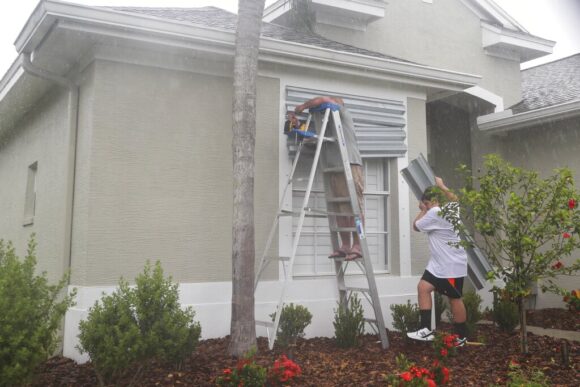Florida officials this week announced the hard launch of My Safe Florida Home, a program that provides up to $10,000 grants for wind-mitigation efforts for homeowners in vulnerable areas. Once completed, the fortification work can result in significant discounts on property insurance premiums.
The Florida Legislature approved the program in May, along with $150 million – enough funding for about 140,000 to 145,000 grants, state Chief Financial Officer Jimmy Patronis said in a statement Monday. Homeowners can apply here. If accepted, homes will be inspected free of charge, and owners can then apply for matching grants
Similar programs had existed in some parts of the state in years past, but this one covers most of the coastal areas. Sales-tax exemptions also are available for materials used for home hardening, through June of 2024.
Not everyone in the hurricane-plagued state is eligible for the wind program, and some strings are attached. The home must be in a wind-borne debris region of the state. A map provided on the program’s website suggests the area (with expected winds of 140 mph or greater) runs roughly from Pasco County on the west coast, southeast to Highlands County, then due north to Volusia County. Parts of counties in the Panhandle also are eligible.
Homeowners also must match half the grant amount. For every $1 the owner provides, the program will provide $2 in grants. To receive the maximum grant amount of $10,000, an eligible homeowner would have to provide $5,000 of their own funds, Patronis’ office said. Patronis’ Department of Financial Services did not say how much the retrofitting would reduce HO insurance premiums, but for one Pensacola home that is not in a flood zone, for example, recent wind mitigation work cut the annual premium from about $6,600 to about $2,500.
Contractors who want to participate in the program can also apply here to become approved for the work, which may include hurricane straps or clips from roof to walls, hurricane shutter systems, and impact-resistant doors and windows.
The speed of the program’s roll out has met with some criticism, after two hurricanes hit the state this fall, four months after the plan was approved by lawmakers. An editorial in the Tampa Bay Times newspaper last week asked, “What is taking so long?”
The Department of Financial Services said it pushed out a “soft launch” of the program earlier this month, and has already received more than 400 applications. The office said in October it directed the program to be expedited during the procurement process for home inspectors.
Inspector contracts went into effect on Oct. 31. The MSFH program initiated a soft launch on Nov. 18, to begin accepting applications for inspections and to test program online systems, before officially launching on Monday.
The newspaper also called for the Legislature, which is set to meet again in special session next month, to expand the program. The paper noted that under existing funding, only about 12,000 homes would be fortified, if each homeowner received the maximum amount.
“When hardened homes stand up to a hurricane, there are fewer insurance claims,” the editorial reads. “That’s good for both private insurance companies and state-run Citizens” Property Insurance Corp.
Wind-mitigation, now baked into Florida building codes, can make a significant difference, reports have indicated. After Hurricane Ian slammed southwest Florida Sept. 28, many newer homes were left standing, with minimal wind damage to roofs and windows, photographs show. Many older homes, most of which were not elevated to newer required levels, were wiped out by the flooding or suffered huge amounts of wind damage.
Top photo: Tim Mullen, 47, and Michael Brissette, 11, cover their windows with hurricane shutters in preparation for Tropical Storm Elsa, in 2021 in Tampa. (Arielle Bader/Tampa Bay Times via AP)
Was this article valuable?
Here are more articles you may enjoy.


 Uber Jury Awards $8.5 Million Damages in Sexual Assault Case
Uber Jury Awards $8.5 Million Damages in Sexual Assault Case  Charges Dropped Against ‘Poster Boy’ Contractor Accused of Insurance Fraud
Charges Dropped Against ‘Poster Boy’ Contractor Accused of Insurance Fraud  Credit Suisse Nazi Probe Reveals Fresh SS Ties, Senator Says
Credit Suisse Nazi Probe Reveals Fresh SS Ties, Senator Says  UBS Top Executives to Appear at Senate Hearing on Credit Suisse Nazi Accounts
UBS Top Executives to Appear at Senate Hearing on Credit Suisse Nazi Accounts 